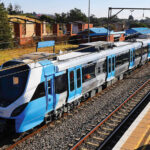Will private rail operators unlock SA’s rail potential?
Will private rail operators unlock SA’s rail potential?
The South African government’s proposed reforms to the rail sector, which will see private rail operators operating on the country’s core rail network, will breathe new life into an industry that is currently under severe pressure. That’s according to African Rail Industry Association (ARIA). But NICK PORÉE warns that this is no quick and easy fix.
The reforms, announced by President Cyril Ramaphosa in October 2020 as part of the country’s Economic Reconstruction and Recovery Plan, aim to supplement Transnet’s capacity, migrate freight volumes from road to rail and stimulate broader economic growth. The plan initially proposed a deadline of October 2021 for its introduction. Speaking at a recent ARIA webinar, Dr Sean Phillips, head of the National Treasury’s Operation Vulindlela unit, said that the current target date for enabling third-party operators in the freight sector was August 2022, with ongoing efforts underway to accelerate the time frame proposed by Transnet.
ARIA estimates that only 17% of South Africa’s general freight currently moves by rail. Transnet moved 215 million tonnes in 2019, down 5% from 2018, with vandalism often paralysing the country’s electric fleet. “However more than 80% of the country’s 36 000 km network has ‘significant capacity’”, says ARIA CEO Mesela Nhlapo.
Moving from road to rail
ARIA research shows that 190 million tonnes of intercity freight and 20 million tonnes of bulk commodities move by road every year. Of this, around 58 million tonnes could move to rail almost immediately, with the sectors that would benefit including agricultural commodities, metals and minerals, cars, containers, hazardous chemicals and liquid bulk.
An estimated R45 billion in rolling stock alone would be required to service this volume requirement, which would provide a massive boost to the local rail manufacturing industry, with significant locomotive and wagon build programmes on the cards. Unlocking this capacity would also grow the rail services segment, finance markets and the advisory market, as specialist advisors would be required across the supply chain.
Importantly, third-party access in this context does not mean privatisation, says Nhlapo, but rather the use of the rail network by private sector rail operators at a fee, similar to the way trucks pay toll fees to access roads to move freight across the country. No new regulation is required to enable third-party access. Regional trading partners have already moved to this model, supporting interoperability and regional trade for pan-African operations.
“The value of this move for the state and Transnet would be significant,” says Nhlapo. “Right now, we have a massive network with excess capacity, which could unlock significant incremental cash flows through access fees from private operators. In addition, the existing infrastructure requires no extra state investment, as track maintenance costs should be largely fixed costs.”
Can new operators deliver?
The presidential announcement that third party train operations will be permitted on the country’s rail network will certainly introduce some interesting potential competition to the highly competitive commercial freight logistics sector. The challenge for the railway in competing for the existing freight tonnages will be dependent on the new operators’ ability to provide safe, reliable and convenient service to industry. They will be hampered by the current infrastructure and operating problems experienced by the railway owner.
Transport volumes are dependent on industrial output or import-export volumes, not the other way round. The addition of 20 953 route kilometres of railway freight capacity to the national transport system will not create additional tonnage or overcome the current trend towards de-industrialisation, which is the result of economic policies. Professor Jan Havenga, head of the Supply Chain Management School at the University of Stellenbosch, told the recent Transport Forum meeting, “Failure to create density (read cargo volumes) on the rail network is a worrying trend, as rail density is the most important element of all for rail success.” The estimates of potential volumes of rail cargo proposed by academics do not appear to fully incorporate the commercial imperatives which drive current road freight volumes.
The fact is that South African industry and agriculture are thinly dispersed over a large area, so that there are only about 10 key points in the country at which rail terminals may be viable, and all distribution to and from the terminals to businesses will be by road, thereby negating the benefits of the cheaper line-haul costs of railways. Inability to obtain consistently full trainloads would hamper efficiency, and the inflexibility of the booking system – having to book defined slots – may mean the trains will have to operate half empty if they are to run on time in order to deliver reliable service.
The assumption that there is a massive tonnage of breakbulk, or containerised freight transported directly to and from ports, is erroneous. More than 75% of containers are removed as quickly as possible from the terminals to off-rail depots and distribution centres in Durban by road. The goods are destuffed, sorted, checked, processed and repackaged, before being reassembled for direct door-to-door delivery by road all over the country.
Realism needed
The reality is that the volumes of agricultural products volumes are seasonal, widely dispersed and highly variable, usually with very definite delivery periods. Assembling export shiploads requires tight and reliable cargo delivery schedules from widely dispersed producers, and requirements such as refrigeration require strict monitoring and control systems. Railways cannot operate sporadically, or for only some months in the year, and services are relatively inflexible.
The estimated volumes of bulk freight on road are to a large extent the result of inherent railway limitations. Road bulk deliveries are to off-rail destinations, smaller consignments, or time sensitive. They are aggravated by inflexible or unreliable service to port or industry caused by infrastructure destruction or lack of equipment. It is noteworthy that the regional railways, which are being expanded with low tonnages, do not suffer from the intense competition of efficient road haulage which exists in South Africa.
The creation of competitive rail services is a definite positive move for South Africa – but it faces all the challenges noted in other countries where the monopoly of state-owned railway services has been gradually released to permit private train operators. The terms and conditions offered by the State will determine the level of investment by the private sector.
Published by
Nick Porée
focusmagsa




